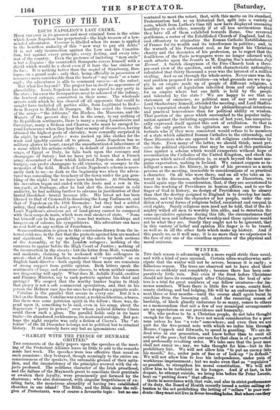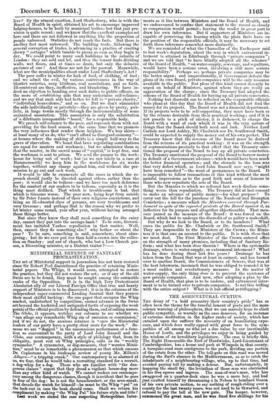WINTER.
THE dark season is advancing with a more rapid stride than usual, and with a kind of pace unusual. Certain ultra-weathervrise anti- cipate that the winter will not be severe, because it is early; a fallacious reason. The trees are observed not to have shed their leaves so suddenly and completely ; because there has been com- paratively little rain. But even if the frost before Christmas should not have its counterpart after Christmas, the best of win- ters is a trial for great numbers of our fellow creatures—for im- mense numbers. Where there is little fire or none, scanty food, scanty clothing, and bad lodging, life will be an endurance for the next three or four months—until the crocus shall a.gain burst in sunshine from the loosening soil. And the recurring season of hardship, of black ghastly endurance to se many, comes to others as a memorandum that not a few of our municipal arrangements are an opprobrium on our providence and humanity. We, who profess to be a Christian people, do not take thought enough for the poor. We have not much consideration for a poor man unless he has " a vote" somewhere; and even then we, are quit for the five-pound note with which 'we indue him through Messrs. Coppock and Edwards, to spend in guzzling. We are-an- deed wise in our generation, and know better than to omit all notice of the poor ; but then our care for that class is of a perverted and professedly revolting -order. We take care that the poor man. shall not annoy us ; nay, we take thought for hint—but in the prohibitory line. We will not allow him "to put an enemy into his mouth,', &c., under pain of fine or of lock-up " in default." We will not allow him to lose his independence, under pain of workhouse imprisonment ; but we make even that as "repulsive" as possible, to strengthen his moral constitution. We will not allow him to be turbulent in his hunger. And if at last, in hie despair, he attempt suicide, we bring him before Sir Peter Laurie, bent on "putting down" that offence. Quite in accordance with that rule, and also in strict performance of its duty, the Board of Health recently issued a notice calling at- tention to the act prohibiting the letting of " cellars " to poor resi- dents : they must not live in fever-breechugholesi But where can they live ? By the utmost exertion, Lord Shaftesbury, who is with the Board of Health in spirit, obtained his act to encourage Unproved lodging-houses, to be built by municipal bodies ; but that just pro- vision is quite recent ; and we know that the excellent examples set here and there are not followed in anything like the proportion of people unhoused. Statistics do not reach the facts. But there is another fact most untoward. The building trade, following the general corruption of trades, is advancing in a practice of erecting showy " cottages" which tumble to pieces as soon as they begin to dry. We could point to many such buildings in the suburbs of London : they are sold and let, and then the tenant finds dividing walls, wet floors, and at times no drain, but only the delusive pretence of one ! And these are not for the poorest. Meanwhile, what are the municipalities about under Lord Shaftesbury's Act ?
The poor suffer in winter for lack of food, of clothing, of fuel ; and we admit the evil, by various contrivances in the way of blanket societies, soup kitchens, coal associations, and so forth.
i
Ill-contrived are they, ineffective, and blundering. We have in- deed an objection to 'handing over such duties to public officers, on the score of establishing aids that may undermine self-reliance ; and we say that such aids had better be left to " private charity," "individual benevolence," and so on. But we don't administer the aids individually orprivately—they are given by proxy, pub- licly, in large towns mostly through the instrumentality of some organized association. This association is only the substitution of a dilettante irresponsible " board," for a responsible body. We preach self-reliance to the poor, and reproach them with not providing for the hard season, at the same time that we promote the very influences that render them helpless. We buy shirts— at least many of us do, who " can't afford to disregard economy "- at houses where the making of shirts is a simple half-way to the grave of starvation. We boast that laws regulating combinations are equal for masters and workmen ; but we administer them so that the master, in the sacred name of " capital," is kept free, and the workman is, sent to prison. We send the pauper to the work- house for being out of work ; but (as we saw lately in a case at Hammersmith) we keep him in the workhouse for six weeks together,- without any charge against him, and without the per- mission to go out and E eek work.
It would be idle to enumerate all the cases in which the re- proach should justly be directed against others rather than the poor; it would also be tedious—and we have too much deference for the comfort of our readers to be tedious, especially as it is the thing most disliked. That which is troublesome is bad, that which is tiresome worse. The poor now, being kept from suicide by Sir Peter Laurie instead of their own religious convictions, and being an ill-educated class of persons, are very troublesome and very tiresome.; and perhaps that is the reason why we prefer to let winter come round, year after year, without having arranged these things better. But since they know they shall need something for the rainy day, cannot they put into the savings-bank ? To be sure, Govern- ment has imitated Yankee repudiation iu that matter. Well, then, cannot they do something else ? why bother us about the poor? To be sure, something is said, somewhere, about alms- giving; but do we ever put less than half-a-crown into the collec- tion on Sunday; and out of church, who but a Low Church par- son, a Dissenting minister, or a District visitor ?—



























 Previous page
Previous page